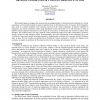Free Online Productivity Tools
i2Speak
i2Symbol
i2OCR
iTex2Img
iWeb2Print
iWeb2Shot
i2Type
iPdf2Split
iPdf2Merge
i2Bopomofo
i2Arabic
i2Style
i2Image
i2PDF
iLatex2Rtf
Sci2ools
JECR
2002
2002
Enabling E-Commerce Growth through the Social Construction of a Virtual Community's Culture
This research paper investigates the elements that encouraged people to visit and actively participate in a virtual community, and eventually leading its guests to purchase from its E-Commerce store. In essence, the E-Commerce store acted as a critical symbiont to the economic survival of the virtual community. In order to establish its uniqueness, the virtual community under study introduced several innovations to its web interface in order to improve human-computer interaction. It also created its own process of interaction and incentive to attract more members. The resulting effects not only made the virtual community unique from other communities, but that it actually created its own emergent culture. Consequentially, the social construction of the community led to the creation of a large and dynamic knowledge repository, supporting the evolution of its emergent culture. Evidences seem to show that the socially-constructed forces driving the virtual community's success are sh...
Related Content
| Added | 22 Dec 2010 |
| Updated | 22 Dec 2010 |
| Type | Journal |
| Year | 2002 |
| Where | JECR |
| Authors | Alexander Y. Yap |
Comments (0)

